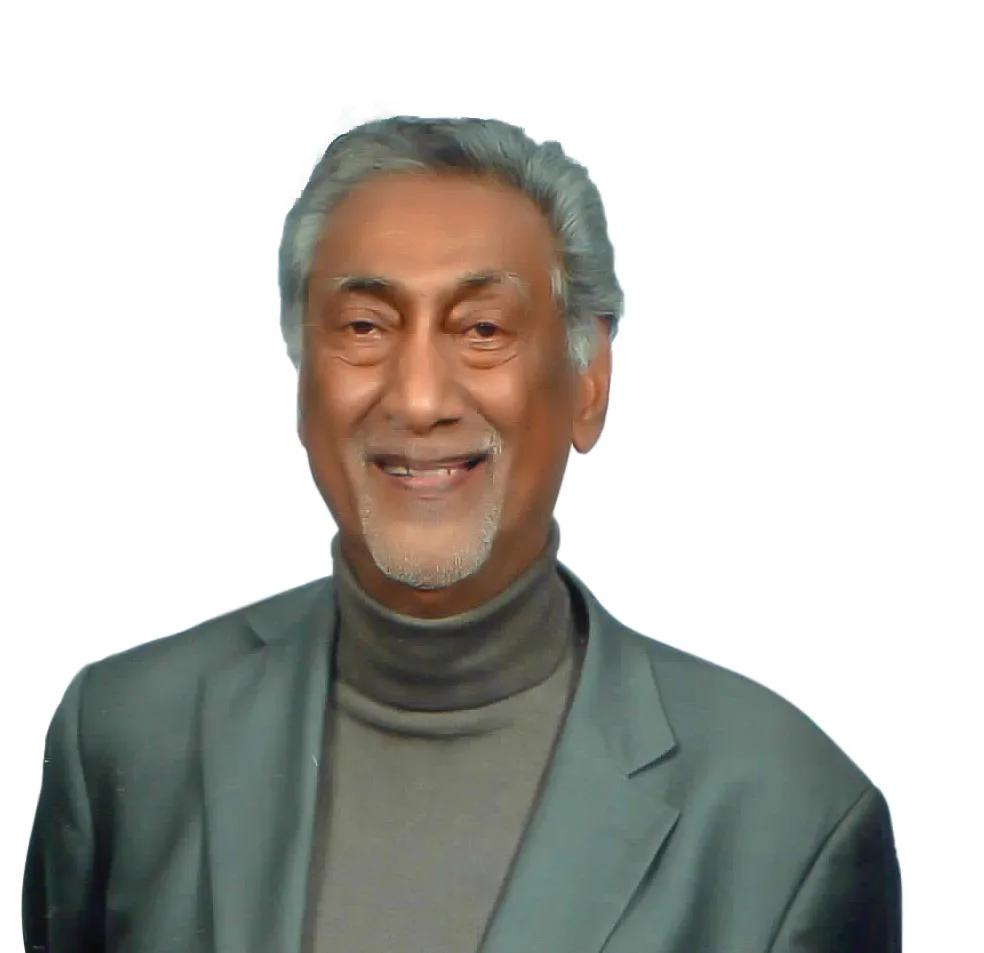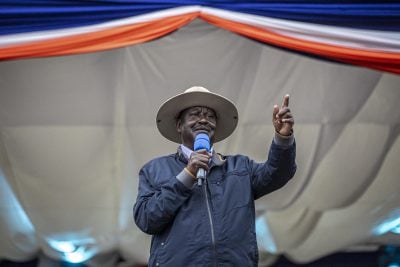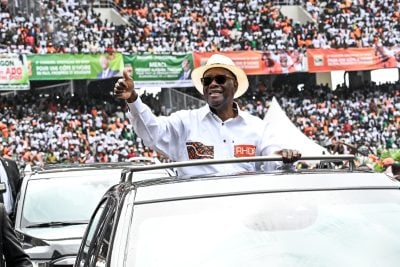Tunisian President Kais Saied’s xenophobic and racist rant in February against the small population of black African migrants in the country has turned the global spotlight back on the country’s politics – and critics say it has exposed an alarming descent into authoritarianism.
The rant – in which Saied made the outrageous claim that migrants were part of a global conspiracy to change the demographic composition of the country – might have been an attempt to draw attention away from the worsening economic situation and a heavy-handed crackdown on opposition figures and parts of the media.
Instead, it has attracted international condemnation, including from the African Union, human rights organisations, the UNHCR and the country’s civil society, who see the progression of an assault on the democratic norms they fought for during the country’s 2010-11 revolution.
Protest spreads
Support for the migrants has thus morphed into support for a restoration of democracy and the formation of a barricade against a rising tide of authoritarianism following the dissolution of parliament and municipal councils.
The Union Générale Tunisienne du Travail (UGTT), the country’s largest and most powerful trade union, has staged protests by thousands of members in eight cities around the country and accused Saied of trampling on basic human rights.
A political coalition, the National Salvation Front, has also defied orders and protested the arrest of scores of opposition figures, demanding the president step down.
But despite the flurry of criticism and growing public opposition to him, Saied, nicknamed “Robocop” by supporters after the Hollywood film about a cyborg policeman – seems to have remained unmoved.
He dismissed accusations that he was a racist by posing with the visiting president of Guinea-Bissau, Umaro Sissoco Embaló. He told the media that he had “friends from the law school who were Africans” and that some of his family members were “married to Africans” – seemingly oblivious to the fact that all Tunisians are Africans.
The wild rhetoric has been echoed in worrying legislative moves. In March, Saied announced measures to further weaken Tunisia’s representative institutions by replacing local governance structures.
“We will discuss a decree to dissolve municipalities and replace them by special councils,” he said.
The elected municipalities, which were poised for elections, are the latest target of the increasingly assertive president’s ire – in 2022, Saied dissolved parliament, then a stronghold of the opposition Ennahda party. In mid-March, foreign and independent journalists were barred from attending the opening session of the new parliament, which critics say is largely toothless.
Who is Kais Saied?
Saied, a constitutional jurist, first came into the public eye during the heady days following the revolution – a key spark in the Arab Spring – which ousted long-term President Zine al-Abidine Ben Ali.
Then politically non-aligned, he was a frequent guest on TV discussion shows, with viral clips of his arguments gaining a following among young Tunisians. He eschewed oratory and rhetorical flourishes, speaking in an unvarying monotone in classical Arabic, which is more formal than the local dialect.
A growing army of supporters convinced themselves that despite his lack of political nous, he could bring order to the parliamentary chaos that reigned in the post-revolutionary years.
Although the country had returned to free elections, the economic and social problems had got worse. Parliament, dominated by the Islamist Ennahda party, was mired in squabbles and jostling for government contracts.
Youth support – including a vigorous “Support Kais Saied” social media campaign – encouraged him to run for office in the 2019 presidential elections. He agreed to stand as an independent social conservative against the flamboyant media mogul Nabil Karoui. Saied won the election with a 72% landslide.
During the run-up to the elections, he had made his views on politics and the social structure abundantly clear, arguing that a good deal of the country’s problems were caused by undisciplined parties who flout the laws. Character, rather than ideology, was the more valuable political asset, he argued, presenting himself as a fighter against corruption, whether financial or “moral”.
He took a strong stance against homosexuality and made it clear that he did not agree that women should have the same inheritance rights as men – a controversial stance in a country where women had won the right to occupy the highest judicial chairs, were CEOs of leading companies and dominated the arts, including the film industry.
Meanwhile, Tunisia’s fragmented post-revolution political environment gave Said opportunities to flex his political muscles. The 2014 constitution had stripped the president of much of his executive power aside from defence and diplomacy, handing a much more robust role to parliament.
But by 2021, parliament, racked by division and buffeted by Covid-19’s economic fallout, was proving unable to solve a web of interlocking economic, social and security issues. In July 2021, Saied suspended parliament after it voted to repeal decrees that would have handed him extensive powers. In March 2022, Saied followed the suspension with a decree dissolving parliament.
As part of his war on corruption, he disbanded the High Judicial Council, a constitutional body set up to guarantee the independence of the judiciary and later sacked around 50 judges and prosecutors.
He drew up a new constitution that concentrated power almost exclusively in the presidency and despite a very low turnout during the referendum, got it passed. Elections followed to choose a new parliament, but political parties were forbidden to participate – candidates could only run as individuals and had to raise their own funds.
An 11% turnout indicated that the majority of the country had lost confidence in his leadership.
International fallout
As opposition against Saied has increased, so have repressive measures, including a series of arrests of prominent personalities and journalists. But criticism of the president has not been confined to the domestic sphere.
His repressive measures have begun to cause concern among international multinationals and the IMF has called a halt to discussing its $1.9bn financing agreement.
This delay has come as a body blow to the exchequer as it also blocks other channels of raising much needed finance. In addition, rating agency Fitch says that banks in Tunisia face heightened liquidity risks.
Continuing its sobering analysis, Fitch says prolonged delays in the approval or worse, the absence of an IMF deal “could lead to a downgrade of Tunisia’s sovereign rating as it would endanger planned external financing disbursements and heighten the risk of a balance-of-payments crisis.”
The World Bank has announced it will be pausing future work with Tunisia following the president’s statements on African migrants, World Bank President David Malpass told staff in a note seen by Reuters.
“Public commentary that stokes discrimination, aggression, and racist violence is completely unacceptable,” he said in the note, written on 5 March.
While current work was continuing, Malpass said the bank was postponing Tunisia’s Country Partnership Framework, which maps out programmes for the 2023-25 period, until further notice. A board meeting on 21 March would review that new strategic engagement, he added.
Opponents say that the situation in Tunisia is becoming increasingly unstable as inflation and the high cost of living continue to bite and the country fractures along political, social and regional lines.
But for now, there are no signs that Saied is prepared to back down on his harsh policy prescriptions despite the international outcry.
One Tunisian dryly tweeted: “Robocop has turned into Terminator.”
Want to continue reading? Subscribe today.
You've read all your free articles for this month! Subscribe now to enjoy full access to our content.
Digital Monthly
£8.00 / month
Receive full unlimited access to our articles, opinions, podcasts and more.
Digital Yearly
£70.00 / year
Our best value offer - save £26 and gain access to all of our digital content for an entire year!

 Sign in with Google
Sign in with Google 



